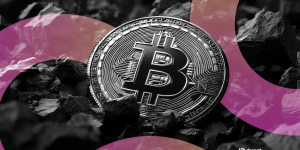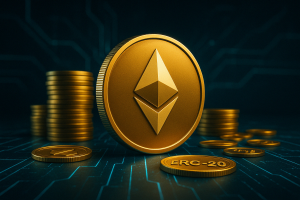What is Worldcoin? Sam Altman’s Eye-Scanning Global ID ‘Orb’ Project Explained
2 years ago CryptoExpert
Artificial intelligence (AI) has developed at a furious pace—and has become undeniably proficient at everything from creating visual effects in television shows and movies to writing and producing award-winning pop songs to coming up with new memes. While the benefits and challenges of AI for early adopters are many, even those outside of the AI world must reckon with the possibility that online activity, text, art, or other types of content may have been computer generated. The power to create endlessly inventive and human-like content is tremendous, but the dangers of deepfakes and counterfeits are also very real.
This is where Worldcoin hopes to step in. Launched in late July 2023 by OpenAI CEO Sam Altman, Worldcoin has introduced a concept called “proof of personhood.” Users verify their “personhood” in the Worldcoin ecosystem in order to participate in its global financial network. The company said just two days after launch that new users were entering its system at an average rate of every 7.6 seconds, indicating substantial growth, with about 2 million users already registered in total. Below, we take a closer look at Worldcoin and what it might mean for crypto and AI enthusiasts alike.
Understanding Worldhood and “Personhood”
“Worldcoin” can refer to multiple interrelated things. Primarily, it is a digital identification platform, though it may also refer to a crypto token of the same name. One of Worldcoin’s goals is to create a massive network of users that have verified that they are humans, rather than bots or AI algorithms.
In order to confirm your personhood through the Worldcoin platform, users must acquire a WorldID, a riff on the concept of Global ID. WorldID is the fundamental “proof of personhood” that Worldcoin’s developers have touted, available to users who have had their irises scanned by a device called the Orb.
Irises, like fingerprints, are distinct for every person on earth. Thus, when the Orb scans a person’s eyes and generates an identification code based on the structure of the irises, it is necessarily going to be a distinct code from anyone else. This so-called IrisCode is generated and then saved on Worldcoin’s decentralized blockchain, set up to ensure that no one is able to fraudulently create or manipulate an existing IrisCode. The scans of the iris are anonymized so as to be untraceable to a particular person but to still ensure that no one can duplicate the process and receive a second IrisCode.
Once a user has an IrisCode, Worldcoin’s platform then issues a WorldID and deletes the images of user irises. Because the info is secured on the blockchain, users do not need to scan their eyes every time they participate in platform activities in order to verify their identities.
Worldcoin has launched Orbs in many major cities across Asia, Europe, North and South America, and Africa, among other regions. In the U.S., some of the first Orbs were made available in San Francisco and New York, with others anticipated in the coming months. The company aims to have 1,500 orbs available in 35 cities around the globe by later this year.
Worldcoin’s App and Crypto Token
The eye scanners and ID codes are simply the first (although likely most talked-about) part of the Worldcoin platform. Users should also familiarize themselves with the World App. The central repository for WorldIDs, World App can be seen as a combination of a cryptocurrency wallet, something like a two-factor authentication service, and a portal to a variety of other apps and offerings.
World App’s primary function is to maintain user credentials, allowing users to remain private but verified through the platform’s ID system. The World App functions as a type of gateway to a growing number of decentralized finance (DeFi) applications, with the benefit that users can be sure that they are interacting with others who have similarly been verified to be truly human. By possessing a WorldID and World App, users can participate in networks with a greatly reduced risk of so-called Sybil attacks, in which a single user creates multiple pseudonymous accounts in order to gain power in a virtual system.
The World App can also hold a limited array of different crypto tokens. As of launch, users can store Bitcoin, Ethereum, and USDC through their World Apps. Worldcoin’s developers have said that users should expect more crypto tokens to be supported in the future.
Besides the app and the aforementioned tokens, users also have access to the cryptocurrency WLD, also known as Worldcoin. Surrounding the launch of Worldcoin, WLD made headlines when the millions of users who took part in the ecosystem’s beta program received an airdrop of WLD. WLD trades are supported by a growing number of crypto exchanges, including major players like Binance and KuCoin.
At launch time, 143 million WLD were circulating, with 43 million of those given out to beta participants and the remainder going to market makers to create liquidity. Eventually, a total of 10 billion WLD will be issued, though this process is planned to take 15 years. Notably, Worldcoin aims to provide WLD to anyone who participates in the ID verification process. This has been one of its major marketing tools, particularly early on in its development.
Worldcoin Developers
Worldcoin is developed by a company called Tools for Humanity. Notably, one of the co-founders of Tools for Humanity—Sam Altman—is also CEO of OpenAI, the company behind the wildly popular ChatGPT chatbot. Altman’s work with OpenAI has likely driven demand for new AI applications and algorithms, thereby also increasing the issues related to verifying personhood that Tools for Humanity aims to address.
Criticism of Worldcoin
Even before it launched, Worldcoin had received ample criticism. In April 2022 an article published in the MIT Technology Review accused the project of using “deceptive marketing practices, [collecting[ more personal data than it acknowledged, and [failing] to obtain meaningful informed consent,” potentially in violation of data protection guidelines in place in Europe and elsewhere in the world. Eventually, the U.K. Information Commission said it would make inquiries into Worldcoin for possible violations of data security protocols.
Worldcoin’s developers issued a response to the criticisms found in the MIT Technology Review. The company said it is “not a data company” and that it is “only interested in a user’s uniqueness…not their identity.” Worldcoin has also been criticized for marketing its ecosystem heavily in underdeveloped nations.
In May of 2023, just two months prior to launch, TechCrunch revealed that hackers had installed malware allowing them to access the dashboard typically only available to the people Worldcoin employs as Orb operators. These operators are responsible for scanning new users with Orbs to collect their biometric data and are compensated for each new user they scan. A spokesperson for Worldcoin said that no sensitive or personal data was accessed or compromised.
Shortly after it launched, Worldcoin’s price shot upward but then slumped, a trajectory that CoinDesk attributed to widespread hesitation among members of the cryptocurrency community. This hesitation may be due in large part to a blog post by Ethereum co-founder Vitalik Buterin shortly after launch. Buterin said he was concerned that the company may be collecting more information from users with its iris scans than it let on. He also suggested that someone could potentially scan another person’s iris to determine if they have a WorldID. Buterin also pointed to the small number of Orbs spaced around the globe as being a hurdle to widespread adoption. Finally, he said that a risk of centralization in the Worldcoin ID-creating process could allow bad actors to potentially gain control of Orbs to create false World IDs. Still, Buterin acknowledged that a successful proof of personhood verification system would likely be very valuable.
Another potential reason for hesitation among the crypto community is the fact that it has received backing from some problematic names in the space. Sam Bankman-Fried, founder of now-defunct crypto exchange FTX, and collapsed crypto hedge fund Three Arrows Capital both invested in Tools for Humanity’s Series A funding round.
Meanwhile, crypto analyst Dylan LeClair of Bitcoin Magazine accused Worldcoin’s developers of “taking a page out of SBF Solana eco playbook, launching and pumping a microcap shitcoin with 1% of total supply in circulation.”












